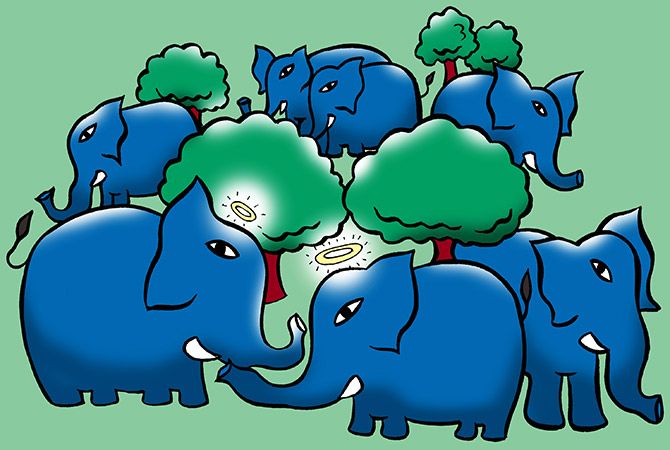India improved its rank on six out of the 10 parameters relating to starting and doing business in a country.
Illustration: Uttam Ghosh/Rediff.com

India improved its ranking on the World Bank's 'ease of doing business' report for the second straight year, jumping 23 places to the 77th position on the back of reforms related to insolvency, taxation and other areas.
India was ranked 100th in the World Bank's Doing Business report last year.
The ranking comes as a shot in the arm for the Narendra Modi government which faces strong dissenting voices from Opposition parties ahead of the general elections next year.
In its annual 'Doing Business' 2019 report, World Bank said India improved its rank on six out of the 10 parameters relating to starting and doing business in a country.
These parameters include ease of starting a business, construction permits, getting electricity, getting credit, paying taxes, trade across borders, enforcing contracts and resolving insolvency.
India was ranked at the 142nd position among 190 nations when the Modi government came to power in 2014. It rose to the 100th spot in the last ranking from 131st rank in the previous year.
New Zealand tops the list of 190 countries in ease of doing business, followed by Singapore, Denmark, and Hong Kong.
The United States is placed eight and China has been ranked 46th. Neighbouring Pakistan is placed at 136.
World Bank put India among the top 10 economies to make the most improvements.
Observing that the two economies with the largest populations, China and India, demonstrated impressive reform agendas, the World Bank said India also focused on streamlining business processes.
India, it said, made starting a business easier by integrating multiple application forms into a general incorporation form.
"India also replaced the value-added tax with the GST (Goods and Services Tax) for which the registration process is faster," it said.
Also, "India made paying taxes easier by replacing many indirect taxes with a single indirect tax, the GST, for the entire country.
India also made paying taxes less costly by reducing the corporate income tax rate and the employees' provident funds scheme rate paid by the employer," the World Bank said.
Stating that a well-designed insolvency framework is a vital determinant of debt recovery, it said the establishment of debt recovery tribunals in India "reduced non-performing loans by 28 per cent and lowered interest rates on larger loans, suggesting that faster processing of debt recovery cases cut the cost of credit."
Further, India reduced the time and cost of export and import through various initiatives, including the implementation of electronic sealing of containers, the upgrading of port infrastructure and allowing electronic submission of supporting documents with digital signatures, it said.
World Bank said India has further streamlined the process of obtaining a building permit and made it faster and less expensive to obtain a construction permit.
It also improved building quality control by introducing decennial liability and insurance.
A commerce and industry ministry statement in New Delhi said: "India's leap of 23 ranks in the ease of doing business ranking is significant considering that last year India has improved its ranking by 30 places, a rare feat for any large country of the size of India."
The country, it added, has improved its ranking by 53 positions in the last two years and 65 positions in four years since 2014.
The World bank ranks 190 countries based on 10 parameters, including starting a business, construction permits, getting electricity, getting credit, paying taxes, trade across borders, enforcing contracts, and resolving insolvency.
"India has improved in rank in 6 out of 10 indicators and has moved closer to international best practices...The most dramatic improvements have been registered in the indicators related 'construction permits' and 'trading across borders'," the ministry said.
The rank has improved by a whooping 129 notches with regards to 'construction permits', 66 points in 'trading across borders', 19 in 'starting a business', and 7 points in 'getting credit'.
Under its National Trade Facilitation Action Plan 2017-2020, India implemented several initiatives that improved the efficiency of cross-border trade, reducing border and documentary compliance time for both exports and imports, World Bank said.
"Enhanced risk-based management now allows exporters to seal their containers electronically at their own facilities; as little as five percent of shipments must undergo physical inspections," it said, adding that India also invested in port equipment, strengthened management and improved electronic document flow.
Regarding getting electricity, newly-adopted regulations from the Delhi Electricity Regulatory Commission require that electrical connections be completed within 15 days of the application's acceptance.
To comply with this regulation, Tata Power Delhi Distribution deployed more personnel as well as tracking tools and key performance indicators to monitor each commercial connection, it said.
In its annual report, the World Bank said overall, the BRIC economies -- Brazil, Russia, India and China -- improved their average ease of doing business score by a combined total of almost 19 points across various areas of business regulation.
All four economies improved in the area of getting electricity and passed reforms simplifying the process of trading across borders, it said.











 © 2025 Rediff.com -
© 2025 Rediff.com -